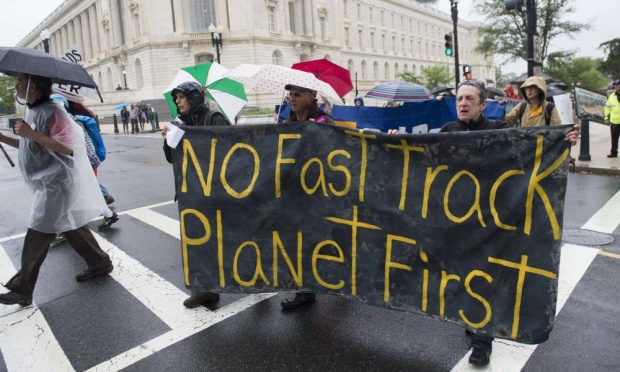Tomorrow members of Congress plan to take a controversial, career-defining vote on Fast Tracking the largest expansion to date of the unpopular status quo trade model. A majority of the U.S. public, most House Democrats and a sizeable bloc of House Republicans stand in opposition.
The coalition opposing Fast Track for the Trans-Pacific Partnership (TPP) is larger and more diverse than in any preceding trade policy fight, including Internet freedom advocates, family farmers, environmentalists, Main Street businesses, labor unions, feminists, faith groups, consumer advocates, development organizations, LGBT groups, and retirees. The breadth of the opposition reflects the wide scope of broadly-held goals that the sweeping TPP pact would undermine: middle class jobs, Wall Street reform, food safety, Internet freedom, a clean environment, and affordable healthcare, to name a few.
But if that weren’t enough for members of Congress still on the fence, a new legal analysis reveals that the TPP may also undermine the U.S. Constitution.
That’s the conclusion of Alan Morrison, a constitutional law professor and associate dean at George Washington University Law School who has practiced law for 45 years, taught at six law schools including Harvard, and argued 20 Supreme Court cases.
Morrison warns in a letter to Congress that the TPP’s proposed expansion of a controversial parallel legal system for foreign corporations, known as “investor-state dispute settlement” (ISDS), “improperly removes a core judicial function from the federal courts and therefore violates Article III of the Constitution.”
TPP’s expansion of ISDS would newly empower thousands of foreign corporations to bypass the entire U.S. legal system and challenge U.S. laws before private international tribunals comprised of three attorneys.
These three individuals would not be constitutionally appointed and salaried U.S. judges, but private lawyers who are paid by the hour. As Morrison points out, “many of those who serve as arbitrators in one ISDS case represent investors challenging governments in another.” The three ISDS lawyers, though acting like a court, would not be bound by a system of legal precedent. They would be authorized to rule against U.S. laws and order U.S. taxpayer compensation in decisions that could not be appealed on the merits or reviewed in U.S. courts.

